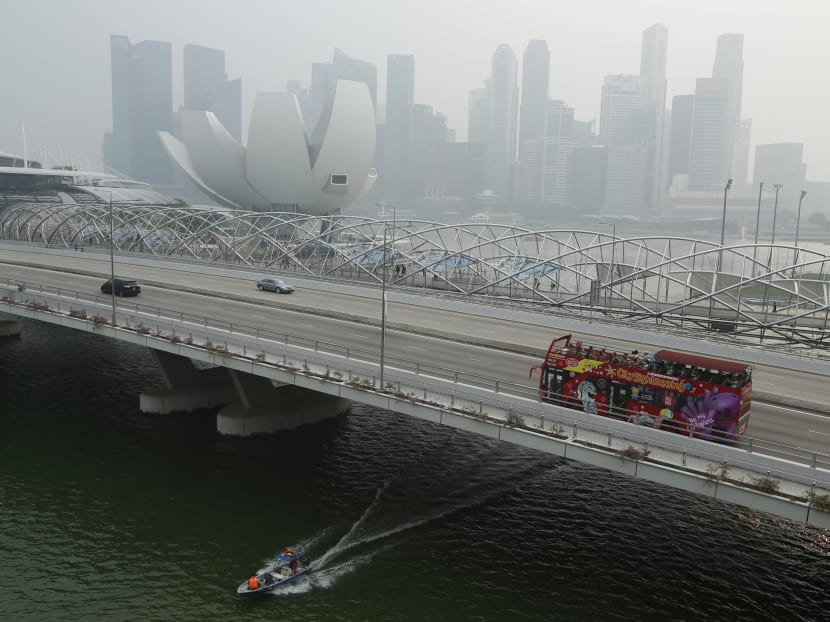Haze expected to enter very unhealthy levels on Thursday
SINGAPORE — Air quality stayed in the unhealthy range today, a slight improvement after the 24-hour Pollutant Standards Index (PSI) was in the very unhealthy range for the most part of yesterday.

A tourist bus passes the skyline of the central business district shrouded by haze in Singapore September 29, 2015. Photo: Reuters
SINGAPORE — Air quality stayed in the unhealthy range today, a slight improvement after the 24-hour Pollutant Standards Index (PSI) was in the very unhealthy range for the most part of yesterday.
However, hazy conditions are expected to persist for the rest of today and tomorrow, said the National Environment Agency (NEA). The 24-hr PSI for the next 24 hours is expected to be in the high end of the unhealthy range and low end of the very unhealthy range. It may deteriorate to the mid-section of the very unhealthy range if denser haze is blown in, said the NEA.
The NEA pointed to the large extent of prevailing haze in the surrounding region.
"Haze spreading from Sumatra is still persisting in our surrounding region. Some haze from Kalimantan has also been spreading westward to our surrounding region, and contributing to the slight deterioration in haze conditions here since late this morning," said the NEA.
As of 9pm, the 24-hour Pollutant Standards Index (PSI) is at 129 to 158 and the three-hour PSI is 176, an improvement from the high of 250 at 2pm yesterday.
A total of 49 hotspots were detected in Sumatra yesterday. The NEA said the low hotspot count was due to cloud cover over parts of the island.
Yesterday, ferry services between Batam and Singapore were cancelled from 7.40am, resuming from Singapore only from 4.50pm onwards, said Batam Fast Ferry. Services will continue as usual today.
Amid the continued hazy conditions, the Singapore Environment Council (SEC) yesterday said it would reach out to the Singapore Manufacturing Federation’s (SMF) 2,800 members to urge stronger action on the part of companies, such as by procuring responsibly from sustainable sources.
For instance, major retailers such as supermarkets could sell palm oil products that are acquired sustainably. Said SEC executive director Edwin Seah at a media briefing: “We hope to work with key stakeholders, the Government and business federations for a sustainable solution. Ideally, we’d like to get all SMF members on board, and say that they procure paper and forestry, palm oil products only from sustainable sources … that will send a strong signal.”
Noting that just 10 per cent of palm oil products from Indonesia are certified to be sustainable by the Roundtable on Sustainable Palm Oil, the SEC hopes to raise this figure to 75 per cent, by urging ethical procurement to put pressure on suppliers.
The SEC also sent a form to 17 companies to declare their commitment to choose sustainable sourcing, among them the Asia Pulp and Paper Company, which has been served a notice by the National Environment Agency requesting for documents and information.
Continuing its investigations, the NEA today has sent a Preventive Measures notice pursuant to Section 9 of the Transboundary Haze Pollution Act to another Indonesian company, PT Bumi Mekar Hijau, in addition to earlier notices sent to four Indonesian companies.
Under the notice, it has requested that PT Bumi Mekar Hijau deploy fire-fighting personnel to extinguish or prevent the spread of any fire on land owned or occupied by them, discontinue any burning activities and submit to NEA any plan of action to extinguish any fire on such land or to prevent its recurrence.
Yesterday, Transient Workers Count Too renewed a call for the Government to impose a mandatory Stop Work Order when the three-hour PSI exceeds 200, or when PM2.5 readings exceed 50 micrograms per cubic metre, for workers who work outdoors or do strenuous in industries such as construction, marine, sanitation and landscaping, noting they do more physically strenuous work.






